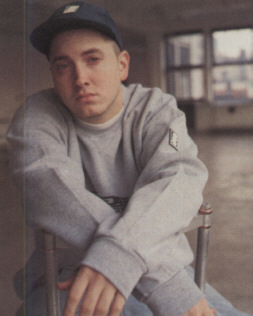No -- Despite the country's increasingly evident moral, political, and economic bankruptcy, no one wants to listen to criticism in the contemporary U.S.A. Everyone wants to be entertained. Michael Moore hauls himself around the country satirizing the society that made Columbine possible, but of those who laugh, who listens?
Marshall Mathers, on the other hand, doesn't explicitly discuss the country, or society, or politics. He just gets out there and talks about himself, and that self includes a background largely shaped by the realities of the American class system. Eminem entertains, and says what he and others around him are feeling and doing. He does it in the accepted patois of the disaffected underclass in their popular medium of choice: hip hop. This is rap as class rage, a cultural spectacle that has replaced political protest. The open question is whether Eminem provokes us usefully with his art, or just distracts us from more vital concerns.
3. "Right into Your Living Rooms I Came": Eminem as boundary-crosser
Even if Eminem is a mere diversion, he is capable of shock. What shocks about
Eminem is surely not what he says -- lots of other artists use sexist, homophobic,
or violent language. It's the fact that he's saying it, and with extraordinary
skill: Eminem imports a way of thinking and talking across an invisible boundary.
Suddenly there's a white boy bringing all that hip-hop stuff -- rough sex,
misogyny, homophobia, poverty, and profanity, all that stuff that is only ok for black
people to express -- into the white middle-classes (and not as a joke, either).
Not to mention the positive values of hip hop: assertiveness, independence, scorn for traditional elites, inversion of dominant cultural norms, and of course the music itself. If, as you've been taught to believe, there is basically no class division, only race, then Eminem is shocking, like Elvis was in his era, because he bring modes of expression that you thought were 'black' right into your bedroom - where you invited them because they where white. As he says in "White America":
See the problem is I speak to suburban kids
Who otherwise would've never known these words exist
These moms probably would've never gave two squirts of piss
Till I created so much muthafuckin turbulence
Straight out the tube right into your living rooms I came, and kids flipped.
"Right into your living rooms": For many white people, class is scarier than race because it's more invasive. Its boundaries are more permeable; they aren't ever going to wake up one morning to find they are Negroes, but they might wake up and find they are working class. (There might be a Commie in your own bathroom!) Jimmy Smith Jr grows up, like Mathers, in Detroit on the borderline between the '313' inner city and the whiter suburbs; especially in the black suit he wears on the cover of his album "The Eminem Show," Mathers could pass for a CEO's son. Consider the video for "Without Me," a recent hit. In it, Eminem plays Rap Boy, a superhero who (with his sidekick Dr Dre) rescues a young middle-class white boy from Eminem's 'parentally explicit lyrics.' We see the boy through the hole in a CD, and he looks like a younger Eminem. Clearly Eminem understands and laughs at the anxiety that he causes the white middle-classes who fear their children might grow up to be 'just like me.' Or consider these lyrics from "White America" from "The Eminem Show":

White America, I could be one of your kids
White America, Little Erik looks just like this
White America, Erica loves my shit
I got to TRL, Look how many hugs i get
Look at these eyes baby blue baby just like yourself
If they were brown
Shady knew shady sits on the shelf
Like Elvis before him, Eminem gives the lie to mainstream America's perversion of W.E.B. DuBois's claim that "the problem of the Twentieth Century is the problem of the color line." Ready to believe the claims of the powerful that socialism, communism, or any form of meaningful socio-economic critique were somehow un-American, the white middle-classes just gave up. In the face of indisputable inequity between the races in the U.S. they acquiesced to the conversion of DuBois' claim into a simplistic belief that the color line is the only division there is, and that the class line just doesn't exist. But Eminem's hair is (bleached) blond, and his eyes are blue. Why is he acting so "black"?



film politics music jay's head poetry art josh ring fysche saddies about archive